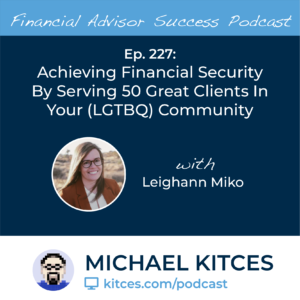Enjoy the current installment of "Weekend Reading For Financial Planners" – this week's edition kicks off with a deep dive into the new "SECURE Act 2.0" legislation that this week passed the House Ways and Means Committee... which means it may still be months until the legislation is ultimately finalized and passed, but provides a good indicator of what's coming next from Congress in the world of retirement planning, from a new increase in the RMD age (from age 72 to age 75 by 2030), expanded catch-up contributions, inflation-indexing the limits on Qualified Charitable Distributions, and even the creation of a new "Office of Retirement Savings Lost and Found" to help workers track down old 401(k) plans.
In addition, there are several additional industry "news" articles, including:
- A New York Appeals court strikes down the state's Best Interest standard for annuity agents
- Ric Edelman's RIA Digital Assets Council launches a new 13-hour online course in cryptocurrency and blockchain
From there, we have several interesting articles on retirement:
- The IRS acknowledges it made a recent 'error' in Publication 590 and that the new 10-year rule for inherited retirement accounts will not require annual distributions in each year (just a liquidation by the end of the 10th year after death)
- How options-based strategies may become the next big thing in retirement income strategies, and why Registered Index-Linked Annuities (RILAs) may be especially well-positioned to provide a cost-effective solution
- How the pandemic is spawning a new wave of early retirees with a "life-is-short" mindset who want to retire and enjoy more of their lives while they can
We've also included a number of practice management articles on the theme of growing and scaling an advisory business:
- A new white paper from Bob Veres and Matthew Jackson explores how the advisory firm of the future is not just incrementally better than the current offering but an entirely different solution
- How hiring a CEO to professionally manage an advisory firm can be the key to growing to the next level
- A look at publicly traded RIAs and investment management firms shows that despite "robo" fears, multiples for advisory businesses continue to expand in the current environment
We wrap up with three final articles, all around the theme of the future post-pandemic workplace:
- How Google was once known for creating campuses that did everything they could to keep employees there, but is now rebuilding for a future where employees are in the office less and less
- The way workplace "perks" are changing where the new key is "flexibility" for workers
- How suburban retail space may become the new big office space as demand for traditional centralized office space continues to wane
Enjoy the 'light' reading!

 Welcome back to the 227th episode of the Financial Advisor Success Podcast!
Welcome back to the 227th episode of the Financial Advisor Success Podcast! Welcome back to the 226th episode of the Financial Advisor Success Podcast!
Welcome back to the 226th episode of the Financial Advisor Success Podcast!
